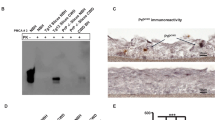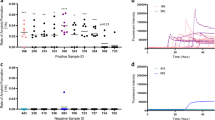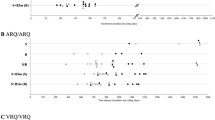Abstract
Because variant Creutzfeldt–Jakob disease (vCJD) in humans probably results from consumption of products contaminated with tissue from animals with bovine spongiform encephalopathy, whether infectious prion protein is present in ruminant muscles is a crucial question. Here we show that experimentally and naturally scrapie-affected sheep accumulate the prion protein PrPSc in a myocyte subset. In naturally infected sheep, PrPSc is detectable in muscle several months before clinical disease onset. The relative amounts of PrPSc suggest a 5,000-fold lower infectivity for muscle as compared to brain.
This is a preview of subscription content, access via your institution
Access options
Subscribe to this journal
Receive 12 print issues and online access
$209.00 per year
only $17.42 per issue
Buy this article
- Purchase on Springer Link
- Instant access to full article PDF
Prices may be subject to local taxes which are calculated during checkout


Similar content being viewed by others
References
Thomzig, A., Kratzel, C., Lenz, G., Kruger, D. & Beekes, M. EMBO Rep. 4, 530–533 (2003).
Bosque, P.J. et al. Proc. Natl. Acad. Sci. USA 99, 3812–3817 (2002).
Glatzel, M., Abela, E., Maissen, M. & Aguzzi, A. N. Engl. J. Med. 349, 1812–1820 (2003).
Andreoletti, O. et al. J. Histochem. Cytochem. 50, 1357–1370 (2002).
Watanabe, K. & Suzuki, A. Okajimas Folia Anat. Jpn. 76, 203–2019 (1999).
Vilotte, J.L. et al. J. Virol. 75, 5977–5984 (2001).
Brown, P., Cathala, F., Raubertas, R.F., Gajdusek, D.C. & Castaigne, P. Neurology 37, 895–904 (1987).
van Duijn, C.M. et al. Lancet 351, 1081–1085 (1998).
Kao, R.R. et al. Science 295, 332–335 (2002).
Ferguson, N.M., Ghani, A.C., Donnelly, C.A., Hagenaars, T.J. & Anderson, R.M. Nature 415, 420–424 (2002).
van Keulen, L.J. et al. J. Clin. Microbiol. 34, 1228–1231 (1996).
Acknowledgements
The authors thank the INRA domain of Langlade & VLA Weybridge for producing and breeding the animals used in this study, Bio-Rad for providing the TeSeE sheep-goat kits and G. Hunsmann (German Primate Center, Göttingen, Germany) for providing mouse monoclonal antibody 8G8. This work was supported financially by 'GIS infections à prion' (French research ministry), the European Union (QLK3-CT-2002-01309) and the Midi-Pyrénées Region, France.
Author information
Authors and Affiliations
Corresponding author
Ethics declarations
Competing interests
The authors declare no competing financial interests.
Supplementary information
Rights and permissions
About this article
Cite this article
Andréoletti, O., Simon, S., Lacroux, C. et al. PrPSc accumulation in myocytes from sheep incubating natural scrapie. Nat Med 10, 591–593 (2004). https://doi.org/10.1038/nm1055
Received:
Accepted:
Published:
Issue Date:
DOI: https://doi.org/10.1038/nm1055
This article is cited by
-
Classical scrapie in small ruminants is caused by at least four different prion strains
Veterinary Research (2021)
-
Prion protein polymorphisms associated with reduced CWD susceptibility limit peripheral PrPCWD deposition in orally infected white-tailed deer
BMC Veterinary Research (2019)
-
Transgenic mouse models expressing human and macaque prion protein exhibit similar prion susceptibility on a strain-dependent manner
Scientific Reports (2019)
-
A Single Amino Acid Substitution, Found in Mammals with Low Susceptibility to Prion Diseases, Delays Propagation of Two Prion Strains in Highly Susceptible Transgenic Mouse Models
Molecular Neurobiology (2019)
-
Divergent prion strain evolution driven by PrPC expression level in transgenic mice
Nature Communications (2017)



